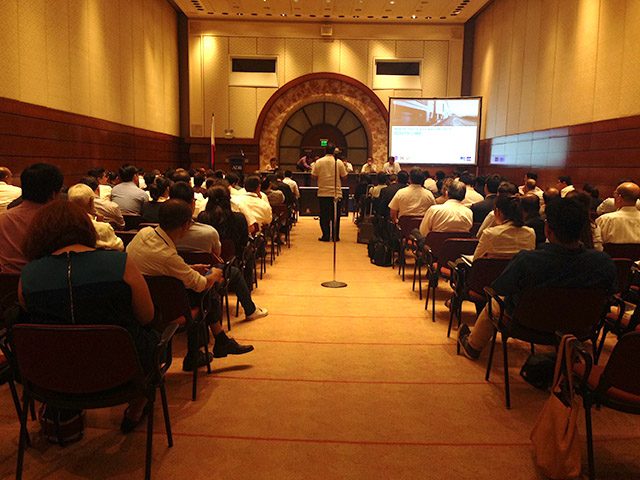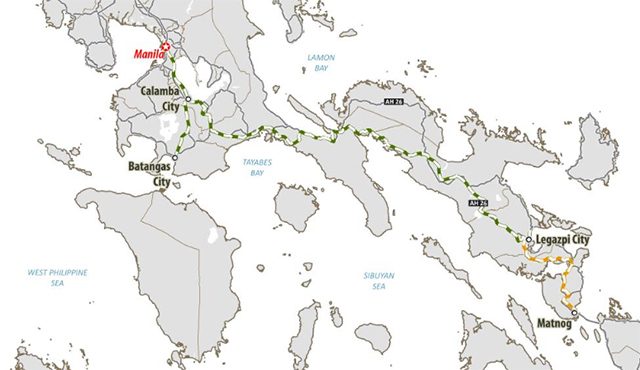SUMMARY
This is AI generated summarization, which may have errors. For context, always refer to the full article.

MANILA, Philippines – Around 30 companies, including the world’s infrastructure giants and the Philippines’ largest conglomerates, have set their sights on the country’s most expensive public-private partnership (PPP) project to date: the P170.7-billion ($3.78-billion) South Line of the North-South Railway Project (NSRP).
The Philippines’ biggest listed firms – including Aboitiz Equity Ventures, Incorporated; San Miguel Holdings Corporation; Metro Pacific Investments Corporation; and Ayala Corporation’s AC Infrastructure Holdings, Incorporated – were at the pre-qualification conference of the NSRP South Line deal on Thursday, August 20.
The other interested local firms include Philippine Skylanders, Incorporated; MRail, Incorporated; PHILAB Industries, Incorporated; Raji, incorporated; Linaheim Corporate Services, Incorporated; Metro Builders Corporation; CFP Strategic Transaction Advisors; Daelim Philippines, Incorporated; BF Corporation; and Pacific Concrete Corporation.
The world’s infrastructure giants that joined the pre-qualification conference for the about 600-kilometer railway deal include:
- Japan-based Mitsui Group Corporation
- Obrascón Huarte Laín, S.A. (OHL)
- Korean Rainbow Holdings, Incorporated
- French firm RATPDev Transdev Asia
- Macquarie Group Limited
- Japan’s Marubeni Corporation
- Acciona Australia
- Aecom Technology Corporation
- UK-based ArcelorMittal S.A.
- Bouygues Travaux Publics Philippines, Incorporated
- Bureau Veritas S.A.
- General Electric Copany
- Isolux Corsan S.A.
- Australia’s Leighton Contractors Proprietary Limited
- Daewoo Group
“The reason there are lots of interested firms is because they usually want projects similar to the size of this deal. There are lots of service providers that can group together,” PPP Center Executive Director Cosette Canilao told reporters on the sidelines of the conference.
Under the project’s terms, the winning bidder will take charge of designing, constructing, financing, operating, and maintaining the following services:
- The 56-kilometer Commuter Rail service, for daily riders on the Tutuban, Manila to Calamba, Laguna route
- The 478-kilometer Long-Haul Rail service, for travelers on the Tutuban, Manila to Legazpi, Albay, route

Among the concerns raised by interested bidders during the conference are right-of-way delivery and interface of the construction of NSRP with other infrastructure projects.
“The right-of-way delivery is the biggest issue investors raised. They were also worried about how other ongoing infrastructure projects will affect the construction of NSRP,” Canilao said.
“You can see that traffic is aggravated by various infra projects. There has to be close coordination with other agencies in terms of starting this project so as not to choke the public with much congested traffic,” she added.
PPP Center’s crowning glory
“This is a very big project and has a lot of buy in from stakeholders, especially the public. It will be a challenge because of the change in government; but I think this is one of the crowning glories of the PPP program. We want it to be awarded within the President’s term (Aquino administration) because this is his program,” Canilao said.
A two-stage bidding process will be adopted for the railway deal. The pre-qualification date is targeted within the fourth quarter of 2015.
The opening of bids is targeted in January 2016, while the awarding is set in March 2016.
The North Line of NSRP, or phase 1 of the deal, is expected to cost P117 billion ($2.51 billion) and is targeted for implementation this year with a 35-year operating period starting 2020. The Japanese government will fund the North Line through an official development assistance loan.
Once the entire railway is operational in 2020, there will be 10 daily trips with 7 train sets passing through 66 stations.
It is expected to generate a demand of 316,000 passengers daily on its opening year, and is projected to entice around 44,000 public and private vehicle users to shift their commutes to the modernized railway. – Rappler.com
$1=P46.53
Add a comment
How does this make you feel?
There are no comments yet. Add your comment to start the conversation.